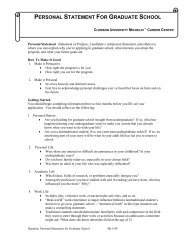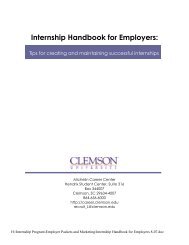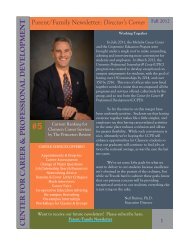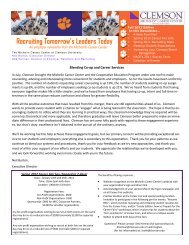Career Guide - Michelin Career Center - Clemson University
Career Guide - Michelin Career Center - Clemson University
Career Guide - Michelin Career Center - Clemson University
You also want an ePaper? Increase the reach of your titles
YUMPU automatically turns print PDFs into web optimized ePapers that Google loves.
THE STEPS TO NETWORK YOURSELF INTO A JOB<br />
Advantages of Networking:<br />
• You will be exposed to the hidden 70-80% of jobs<br />
in your field. Likewise, you will encounter little<br />
competition for these jobs.<br />
• You are less likely to encounter rejection since you<br />
are not asking directly for a job—instead, you are<br />
simply asking for information, referrals and to be<br />
remembered.<br />
• You are exposed to higher-level positions.<br />
• You go directly to the people who have influence on<br />
the hiring process.<br />
• You will be considered when a contact hears of a<br />
job, and may be referred as a result.<br />
• Remember, by genuinely asking advice about your<br />
career, you will make an impression on someone<br />
and be remembered. Once you have established a<br />
favorable contact, it is very likely that you will be<br />
considered for a job when it becomes available.<br />
Step 1: Prepare a list of all the professional people in your field<br />
of interest, as well as other people who may know someone in<br />
your field. The average person usually comes up with 50 or<br />
more names—set your goal even higher.<br />
Your list might include the following people:<br />
• Friends/Relatives/Neighbors<br />
• Teachers<br />
• Past Employers<br />
• College Alumni via the Alumni Association/<br />
Regional Clubs/Academic Societies/Constituency<br />
Groups<br />
• Dentists/Doctors/Hairdressers<br />
• Bankers/Lawyers/Stock Brokers<br />
• Clergymen/Politicians/Librarians<br />
• Small Business Owners<br />
Step 2: Call the people on your list who are outside the field you<br />
are interested in and ask them if they know anyone in the career<br />
you are considering. At this time, stress to them that you are<br />
NOT looking for a job. Your contacts will be more willing to give<br />
you names if they understand that you will not be annoying their<br />
friends for a job, but rather requesting advice on what this field<br />
is really like and whether it is appropriate for you.<br />
Your goal at this stage is to interview experts to learn whether<br />
certain fields are really what you want, while also building a<br />
loyal network of professionals who will refer you to their friends<br />
when a position does become available.<br />
<strong>Center</strong> for <strong>Career</strong> and Professional Development<br />
www.clemson.edu/career<br />
23<br />
Step 3: From your general contact list, develop a targeted list of<br />
contacts who work in the field that you are considering.<br />
Step 4: Call everyone on your revised list of contacts and<br />
arrange a meeting time to get advice on breaking into your<br />
desired field(s). Tell them who referred you and ask for about<br />
15 minutes of their time to gather information on your chosen<br />
career.<br />
Step 5: Conduct your informational interview. When you meet<br />
your contact, HAVE YOUR QUESTIONS READY. Some sample<br />
questions are:<br />
• How did you get started in this field?<br />
• What skills or training are required?<br />
• What do you find most rewarding about your work?<br />
• What type of advice would you give to young people<br />
who want to enter this career?<br />
• What is the job outlook in this field?<br />
• What do you do in a typical day?<br />
• What types of people do you work with?<br />
Be specific with your questions, and let your contact know that<br />
you are NOT applying for a job. You will go a lot further if you<br />
simply ask advice about their field, since people are usually<br />
willing to give advice freely, but are not always ready to help<br />
you get a job. Toward the end of the conversation ask if your<br />
contact can refer you to others in your field so that you can get<br />
more information. Remember that information gathering is a<br />
two-way street. During your interview, share information with<br />
your contact that you have learned about the field through your<br />
research.








